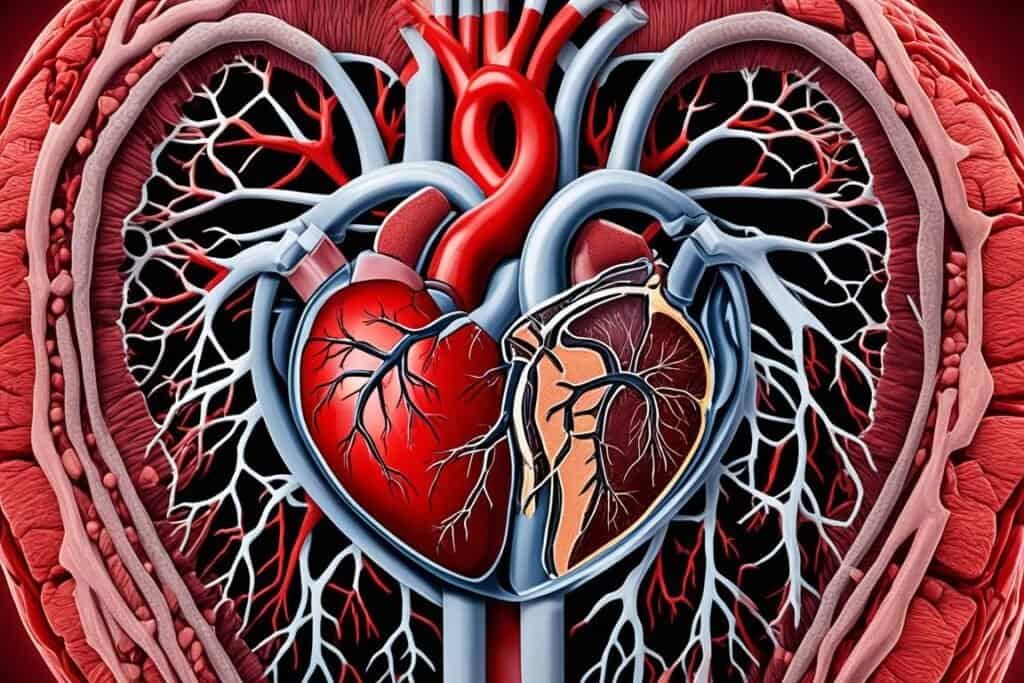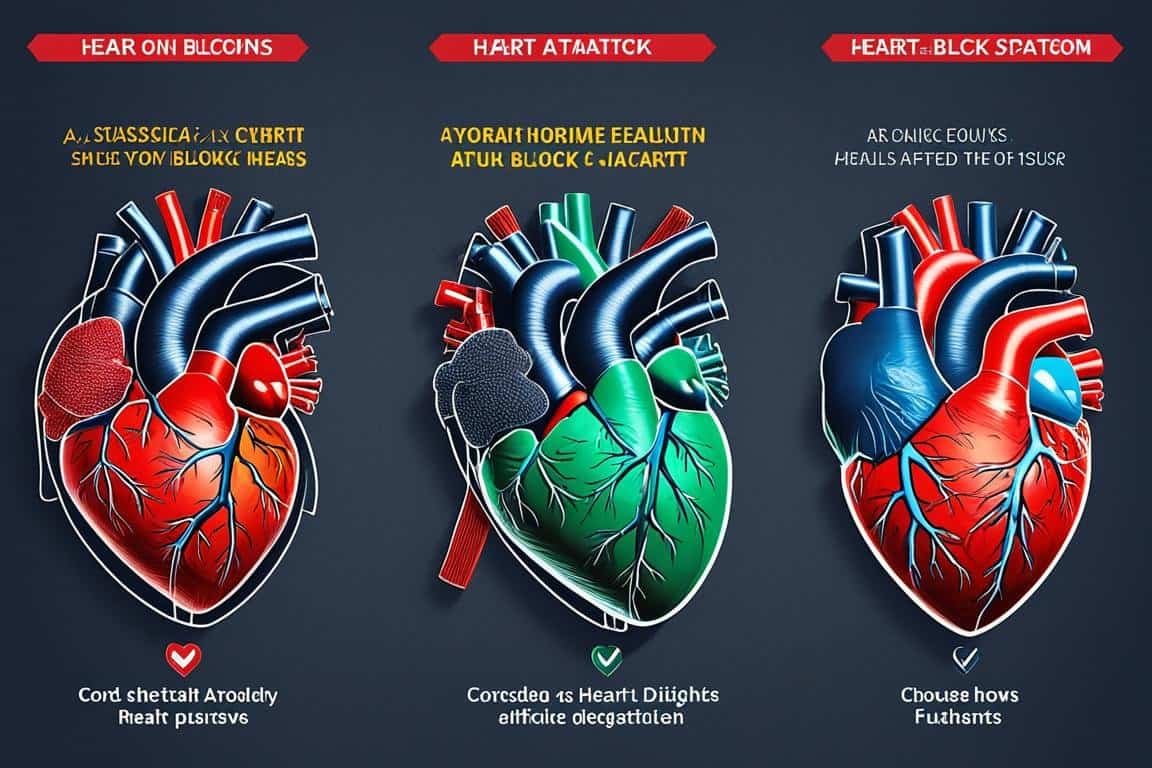When it comes to cardiac conditions, it’s important to understand the difference between a heart attack and heart block. While both conditions involve the heart, they have distinct causes, symptoms, and treatment approaches. Knowing the signs and seeking prompt medical attention can potentially save lives.
A heart attack occurs when a blocked artery prevents oxygen-rich blood from reaching a section of the heart. This blockage can lead to the death of heart muscle and is typically caused by a buildup of plaque in the coronary arteries. Common symptoms of a heart attack include chest pain, shortness of breath, nausea, and fatigue.
In contrast, heart block is a type of arrhythmia that affects the electrical system of the heart. It causes an irregular and slower heartbeat. Heart block can be caused by heart disease, heart attack, medications, or age. Symptoms of heart block can range from lightheadedness and fainting to more severe symptoms like shortness of breath and chest pain.
Treatment approaches for heart attack and heart block vary. A heart attack requires emergency medical intervention, such as administering blood-thinning medications and restoring blood flow to the blocked artery through procedures like percutaneous coronary intervention or coronary artery bypass grafting. On the other hand, treatment for heart block depends on the type and severity of the condition. Mild cases may not require treatment, while more severe forms may necessitate the use of a pacemaker to regulate the heart’s electrical signals.
Key Takeaways:
- A heart attack occurs when a blocked artery prevents blood flow to the heart, while heart block is a condition that affects the heart’s electrical system, causing an irregular and slower heartbeat.
- Heart attack symptoms include chest pain, shortness of breath, nausea, and fatigue, whereas heart block symptoms can range from lightheadedness to more severe symptoms like shortness of breath and chest pain.
- Heart attack treatment involves emergency medical intervention and long-term management through medication therapy and lifestyle changes, while heart block treatment depends on the type and severity of the condition.
- Recognizing the symptoms of heart attack and heart block and seeking prompt medical attention is crucial for effective management of these conditions.
- Consult a healthcare professional for personalized advice and guidance related to heart health.
Understanding Heart Block
Heart block is a type of arrhythmia that affects the electrical system of the heart, causing it to beat irregularly and slower than usual. This condition disrupts the normal flow of electrical signals, leading to an abnormal heartbeat rhythm. Understanding the different types of heart block, their symptoms, causes, and treatment options can help you navigate this condition effectively.
Types of Heart Block
There are three types of heart block:
- First-degree heart block: This is the mildest form of heart block, which usually doesn’t cause symptoms or require treatment.
- Second-degree heart block: This type is further divided into two subtypes: type 1 and type 2. Type 1 heart block is considered less severe, while type 2 heart block is more concerning and may require treatment with a pacemaker.
- Third-degree heart block: Also known as complete heart block, this is the most severe form of heart block. In this case, the electrical signals are completely blocked, leading to a significant slowing or complete pause in the heartbeat. Third-degree heart block can cause life-threatening symptoms such as shortness of breath, dizziness, and chest pain.
Symptoms of Heart Block
The symptoms of heart block can vary depending on the type and severity of the condition. In some cases, heart block may not cause noticeable symptoms. However, when symptoms do occur, they may include:
- Irregular or skipped heartbeats
- Slow heartbeat (bradycardia)
- Fainting or feeling lightheaded
- Shortness of breath
- Chest pain or discomfort
Causes of Heart Block
Heart block can be caused by various factors, including:
- Heart disease
- Prior heart attack
- Side effects of certain medications
- Age-related changes in the heart’s electrical system
Treatment for Heart Block
The treatment options for heart block depend on the type and severity of the condition. Mild cases of heart block may not require specific treatment, while more severe forms may necessitate intervention. Common treatment approaches include:
- Pacemaker implantation: This involves the insertion of a small device that helps regulate the heartbeat by sending electrical signals to the heart.
- Medications: Certain medications can be prescribed to help manage the symptoms associated with heart block.
- Lifestyle modifications: Making healthy lifestyle changes, such as quitting smoking, maintaining a balanced diet, and exercising regularly, can help improve heart health and manage heart block.
Exploring Heart Attack
A heart attack, also known as a myocardial infarction (MI), occurs when a coronary artery becomes blocked, cutting off the blood flow and oxygen supply to a section of the heart. The main symptom of a heart attack is chest pain or discomfort, which can radiate to other areas such as the neck, jaw, arms, back, and stomach. Other symptoms may include trouble breathing, nausea, lightheadedness, and fatigue.
Common causes of a heart attack include a buildup of plaque in the coronary arteries, spasm in a coronary artery, or tear in the walls of the coronary artery. Treatment for a heart attack may involve emergency medical intervention, such as administering blood-thinning medications and restoring blood flow to the blocked artery through procedures like percutaneous coronary intervention or coronary artery bypass grafting.

| Symptoms of Heart Attack | Causes of Heart Attack | Treatment for Heart Attack |
|---|---|---|
|
|
|
Differentiating Heart Attack and Heart Block
While both heart attack and heart block involve the heart, they are distinct conditions. A heart attack is caused by a blockage in a coronary artery, leading to the death of heart muscle. In contrast, heart block is a type of arrhythmia that affects the electrical signals in the heart, causing an irregular and slower heartbeat.
When it comes to symptoms, heart attack primarily revolves around chest pain and discomfort, whereas heart block symptoms can range from lightheadedness and fainting to more severe symptoms like shortness of breath and chest pain.
The table below summarizes the differences between heart attack and heart block:
| Condition | Cause | Symptoms |
|---|---|---|
| Heart Attack | Blockage in a coronary artery | Chest pain, discomfort, shortness of breath, fatigue, nausea |
| Heart Block | Electrical signal disruption in the heart | Lightheadedness, fainting, chest pain, irregular heartbeat |
The causes, diagnosis, and treatment approaches for these conditions also differ. Understanding the distinctions between heart attack and heart block is crucial for accurate diagnosis and effective treatment.
Diagnosis and Testing for Heart Attack and Heart Block
Diagnosing a heart attack and heart block involves a comprehensive approach that includes medical history evaluation, physical examination, and a variety of diagnostic tests. These tests aim to accurately identify the presence of a heart attack or heart block, determine their severity, and guide appropriate treatment decisions.
Heart Attack Diagnosis:
When a heart attack is suspected, healthcare professionals will typically utilize the following diagnostic tests:
- Electrocardiogram (ECG): An ECG is a standard test used to record the electrical activity of the heart. It provides valuable information about the heart’s rhythm and detects any abnormalities that may indicate a heart attack.
- Blood Tests: Measurement of cardiac enzymes is crucial in diagnosing a heart attack. Elevated levels of cardiac enzymes, such as troponin, indicate heart muscle damage.
- Imaging Tests: Imaging tests like echocardiography or coronary angiography may be performed to assess the extent of damage to the heart and identify the location of the blocked artery.
Image of ECG machine:

Heart Block Diagnosis:
The diagnosis of heart block involves several tests to determine the presence and type of blockage in the heart’s electrical system. The main diagnostic tool used is an electrocardiogram (ECG), which records the heart’s electrical signals. Based on the ECG findings, the specific type of heart block can be identified:
- First-Degree Heart Block: Characterized by a delay in conduction but with all electrical signals reaching the ventricles. It often does not require treatment.
- Second-Degree Heart Block: Divided into two types – Type 1 (Wenckebach) and Type 2. Type 1 is usually well-tolerated and may not require treatment, while Type 2 is more severe and often necessitates a pacemaker.
- Third-Degree Heart Block: Considered the most severe form of heart block, where no electrical signals pass from the atria to the ventricles. It requires immediate medical attention and treatment with a pacemaker.
In addition to the ECG, other monitoring methods, such as Holter monitoring, cardiac event monitoring, or implantable loop recorders, may be used to assess heart rhythm over a prolonged period of time.
Summary:
Accurate diagnosis of a heart attack and heart block is essential for determining the appropriate treatment approach. The use of an electrocardiogram (ECG) is a common diagnostic tool for both conditions. For heart attack diagnosis, additional blood tests and imaging tests are performed. In the case of heart block, the ECG helps identify the type of blockage, and other monitoring techniques may be utilized for further evaluation.
Treatment Options for Heart Attack and Heart Block
When it comes to managing heart attack and heart block, the treatment options vary depending on the specific condition. For heart attack, immediate medical intervention is crucial to restore blood flow to the affected artery and prevent further damage to the heart muscle.
Immediate treatment for a heart attack often involves:
- Medications: You may be prescribed blood-thinning medications, such as aspirin or antiplatelet drugs, to prevent blood clots from worsening the blockage.
- Emergency procedures: Procedures like percutaneous coronary intervention (PCI) or coronary artery bypass grafting (CABG) may be performed to restore blood flow by opening the blocked artery.
However, the treatment for a heart attack does not end with emergency measures. Long-term management is vital to minimize the risk of future cardiac events.
Long-term treatment for heart attack may involve:
- Medication therapy: Your doctor may prescribe medications to manage risk factors such as high blood pressure and cholesterol levels. These may include beta-blockers, ACE inhibitors, statins, or other appropriate medications as per your specific needs.
- Lifestyle changes: Adopting a heart-healthy lifestyle is crucial for preventing future heart attacks. This may include regular exercise, maintaining a healthy weight, eating a balanced diet low in saturated fats, quitting smoking, and managing stress effectively.
- Cardiac rehabilitation: Participating in a cardiac rehabilitation program can help you recover and improve your heart health after a heart attack. These programs usually include structured exercise sessions, education on heart-healthy living, and emotional support.
On the other hand, the treatment for heart block depends on the type and severity of the condition. Not all cases of heart block require treatment, especially if it is the milder first-degree heart block.
Treatment options for heart block may include:
- Pacemaker: In more severe cases of heart block, a pacemaker may be recommended to regulate the heart’s electrical signals and ensure a regular heartbeat.
- Medication therapy: Some medications may be prescribed to manage symptoms or underlying causes of heart block, such as heart disease or medication side effects.
To determine the most appropriate treatment options for your specific condition, it is essential to consult with a healthcare professional who specializes in cardiovascular disorders. They will assess your medical history, conduct diagnostic tests, and provide an individualized treatment plan tailored to your needs.
Conclusion
Differentiating between a heart attack and heart block is crucial in understanding their unique characteristics, symptoms, causes, and treatment options. A heart attack occurs when a coronary artery is blocked, causing damage to the heart muscle. Conversely, heart block affects the heart’s electrical system, resulting in an irregular and slower heartbeat.
To effectively manage these cardiac conditions, it is important to recognize their symptoms. While heart attack symptoms often include chest pain or discomfort, heart block symptoms can vary from lightheadedness to more severe signs like shortness of breath and chest pain.
Seeking prompt medical attention and following the recommended treatment approaches are essential in dealing with both heart attack and heart block. The causes of these conditions differ, as do the treatment options available. By understanding the distinctions and making informed decisions, individuals can take proactive steps in managing their heart health.

